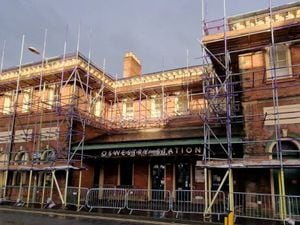Labour MPs call for release of Shrewsbury 24 papers in Commons debate
Papers relating to the so-called Shrewsbury 24 dispute which led to pickets being jailed over 40 years ago must be released so the public can judge whether the convictions were justified, Labour has said.
The Opposition are calling for the release of papers relating to the Shrewsbury 24 who were arrested five months after the 1972 building workers' strike and charged under the 1875 Conspiracy Act, with six sent to prison including Royle Family actor Ricky Tomlinson, who was in the Commons today.
Some Labour MPs argue the papers will reveal government and employer interference with the prosecutions while others want them released so the public can judge what happened for themselves.
Labour's David Anderson (Blaydon), leading a debate in the Commons, said: "The ongoing refusal to release all the documentation relating to this case only hardens the suspicions of those involved.
"We've already seen through the morass of papers that are in the public domain clear evidence of the pattern of the pressure that was applied in order to give the results that the employers wanted.
"We here today have a chance to set in train a process that should lead those in power to come to the view that is in the real public interest and clearly in the matter of national justice that the remaining papers are released.
"Only then can we see just how far the tentacles of big business spread in the public realm.
"Whether we like it or not we are responsible for the failures of the state in the past. Today, collectively we can start to redress those failings."
Labour's Jim Fitzpatrick (Poplar and Limehouse) said the papers should be published for the sake of transparency in politics.
He said: "The motion in front of the House is calling for the publication of papers. It's not calling for anybody to make judgments for and against, it's asking for the papers to be published so the public can make a judgment call.
"Some of us believe those papers will show certain things, obviously colleagues on the other side might think they will show something else. But surely we can agree on transparency in politics and the publication of documents."
Mr Fitzpatrick had been intervening in a speech by Tory Sir Gerald Howarth (Aldershot) who said the presence of 34 Labour MPs at the debate showed that old Labour is alive and well.
Drawing jeers from Opposition benches, he claimed the party's MPs were romanticising mob rule and violence and told them to renounce trade union leaders' practices of the 70s and 80s to have any chance of winning the next election.
He said: "It's very interesting to see there are no less than 34 members of the Labour Party present today and trade unionists so it's quite clear that old Labour is still alive and well and in some respects seeking both to justify and to romanticise mob rule and violence and intimidation.
"If you wish to secure the support of the British people at the next election, you do need to make it clear to them you have renounced the kind of practices that prevailed in the 1970s and 1980s because it's very important that people understand the conditions that were applying at that time."
Former Labour justice minister David Hanson said he had tried in government to get the papers released.
And he told the Commons: "The judgment was made under the Labour government to release that information in 2012. Being a kind, open soul, I wrote to the (new) minister in 2010 and said would he confirm the information would be released in 2012? He wrote back to me on November 8, 2010, and said the blanket covering is until 2012.
"I wrote to him again on March 23, 2011, he (Ken Clarke) said he was reviewing it and would make a decision. I wrote on November 20, 2012, and was told by (Chris Grayling) the now Justice Secretary that on December 19 (Mr Clarke) had signed a new instrument which records he has given his approval for the retention of the records.
"He has retained the records for four reasons. A paragraph from Sir Michael Hanley, director general of the security service to Sir John Hunt, of the Cabinet Office, a copy of the report of the memorandum, a paragraph from John Hunt to Mr Armstrong dated January 13, and a paragraph of memorandum from John Hunt relating to the report.
"I think it is important that information is in the public domain and I do so because this is a Government that is currently reviewing the 30 year rule and reducing it to 20 years. Yet in this case, where we have 40 years of information, it is seeking to extend that information being with held until 2022.
"It seem to me to be unfair."
Labour MP Steve Rotheram said he would not defend the last administration, run by his own side, which had also not decided to release the papers.
But he said: "We have seen documents recently relating to the Brixton riots, the Lockerbie bombing, Mrs Thatcher's attempted use of the Army against the miners and details of how she made no effort whatsoever to make the case for the release of Nelson Mandela.
"But perhaps most surprisingly in November 2013, the Guardian reported details of secret memos released relating to the efforts of MI5, MI6 and GCHQ to maintain a Cypriot base. Given the political, strategic and geographical importance of that base, it is surprising I think to everyone on this side that an issue of such magnitude does not warrant an extension of the security and intelligence instrument of the Public Records Act 1958.
"But documents relating to a couple of dozen strikers during a building workers' dispute 40 odd years ago are deemed to be a risk to our national security? It would be farcical if it wasn't so serious for those whose lives have been deeply scarred by this miscarriage of justice."
The Conservative MP for Shrewsbury Daniel Kawczynski said his constituents told a story of violence and intimidation - and most of all wanted transparency to clear up the issue once and for all.
He said: "1972 was a time of great industrial strife and some people felt they had the right to intimidate and to use violence in order to get their political objectives.
"I have two questions: we have to ask . . . . why over a long period of time the Labour Party, who were in office for three terms, we have to understand why former Labour lord chancellors have decided not to release this information. I think that is a perfectly legitimate question to ask.
"I also say, I will be interested to hear from the minister (Simon Hughes) if he is going to release the documents and if he is not, why he is not prepared to release them. I have been approached by constituents who . . . feel clearly they don't want documents to be withheld from the public domain if there is the potential for a cover up.
"As a community, I think this argument is very balanced in Shrewsbury. There are people who want to remember the violence . . . they want people to remember the violence they experienced but they also want the Government to account as to why they will not release the documents."
mfl
Labour former minister Tom Watson said some documents part-released were connected to a current affairs programme broadcast on November 13, 1973 - the day the prosecution completed their case against the pickets.
He said the film included "highly tendentious" commentary from Woodrow Wyatt and was interspersed with footage which included showing two of the six defendants and images of a march through Shrewsbury in which the defendants could be made out.
Mr Watson said there was also a 30-minute studio discussion which followed the programme. He noted it was not broadcast in every ITV region but was transmitted in the region covering Shrewsbury.
He told the Commons: "The final words of that discussion were from the then-MP Geoffrey Stewart-Smith. He was asked by the studio chairman, the late Richard Whiteley: 'Can you give me one example in 1973 of blatant communist influence?'
"Stewart-Smith replies: 'The violence in the building strike was called by a group, the Building Workers' Charter operating in defiance of the union leadership, indulging in violence and flying pickets and this is an example of these people operating, opposing free trade unions'.
"Can you imagine anything more blatantly prejudicial to a trial than that?"
He went on: "It's my contention that the file reveals the highest level of collusion between the government, the security services and the producers of the film."
Of the need to release the final files, Mr Watson said: "The Stasi published their files after the Berlin Wall came down in 1989. I think we can."





